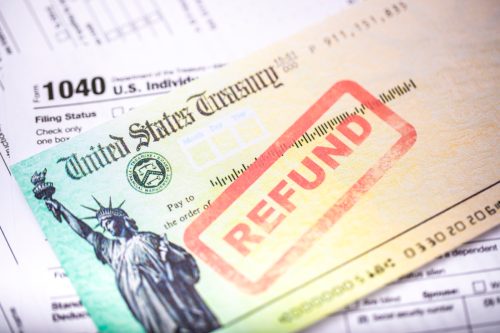IRS Is Processing Refunds Faster This Year—Here’s When You Can Expect Yours

Tax season can be a stressful and confusing time—but it’s not without its rewards. For many of us, filing means getting one step closer to a refund from the Internal Revenue Service (IRS). Millions of taxpayers expect to receive a refund from the agency after they submit their tax returns, and these can often be substantial, depending on how much you forked over during the year. Early birds who filed their taxes already are seeing some impressive turnaround time, which could be good news for those of us who haven’t even thought about taxes yet. Read on to find out when you can expect your return this year.
READ THIS NEXT: 3 IRS Deductions You Can’t Take This Year, Experts Warn.
The IRS is processing refunds faster this year.

After years of processing delays amid the pandemic, it appears that the 2023 tax season is off to a much better start. When the IRS released its first weekly report for this year’s filing statistics, the agency revealed it was processing returns at a 29 percent higher rate than it was in 2022. This rate has slowed down in the weeks since, but the IRS is still firing off refunds faster than it was last year.
As of Feb. 17, the IRS had processed just over 36.7 million tax returns, compared to 33.4 million over the same period in 2022—an increase of 9.9 percent. In fact, the agency has processed nearly all the returns it has gotten so far this year. Out of 36.8 million total returns received in 2023, the IRS has processed 36.7 million.
This same time last year, a total of 35.9 million returns had been received, but the IRS had only processed 33.4 million of them.
Most taxpayers will receive their refund in less than three weeks.

Mark Friedlich, CPA, a tax lawyer and the vice president of U.S. Affairs for Welters Kluwer Tax & Accounting, has cautioned taxpayers against getting too excited about the faster processing times right now.
“As we know, it’s still early in the tax season, but this is certainly a very good start,” he wrote in a post on his company’s website. “The IRS expects approximately 168 million individual tax returns to be filed this season. Much work remains to be done.”
So what can you expect? The IRS says it issues more than 9 out of 10 refunds in less than 21 days after receiving a return. To track your payment, you can use the agency’s online tool Where’s My Refund?, which is available to taxpayers 24 hours after they e-file their 2022 tax return.
“You will get personalized refund information based on the processing of your tax return,” the IRS explains on its website. “The tool will provide an actual refund date as soon as the IRS processes your tax return and approves your refund.”
RELATED: For more up-to-date information, sign up for our daily newsletter.
But certain factors could delay your payment.

Don’t bank on getting your refund within three weeks, however. “The IRS cautions taxpayers not to rely on receiving a 2022 federal tax refund by a certain date, especially when making major purchases or paying bills,” the agency said in a November press release.
After all, there are several things that could result in your refund taking longer than three weeks.
The IRS says the “safest, fastest way to receive your refund” is by filing your return electronically and choosing direct deposit. If 21 days have already passed and you haven’t gotten anything back yet, the agency says it could be because your return was filed on paper, includes errors, is incomplete, needs further review, is affected by identity theft or fraud, has claims filed for certain credits, or includes the injured spouse allocation form.
“Many different factors can affect the timing of your refund after we receive your return,” the IRS explained in its press release. “Even though we issue most refunds in less than 21 days, it’s possible your refund may take longer.”
You should also prepare for a smaller refund this year.

More people are getting refunds than usual, which may also be good news for you. As of Feb. 17, the agency has issued 25.9 percent more total refunds than it did in 2022.
But if you do get a refund, don’t expect the payout to be as big as it has been in recent years. Despite sending out more refunds in general, the average refund amount from the IRS for each taxpayer is actually 11.2 percent lower than it was last year.
“Refunds may be smaller in 2023,” the agency warns. “Taxpayers will not receive an additional stimulus payment with a 2023 tax refund because there were no Economic Impact Payments for 2022. In addition, taxpayers who don’t itemize and take the standard deduction, won’t be able to deduct their charitable contributions.”
Best Life offers the most up-to-date financial information from top experts and the latest news and research, but our content is not meant to be a substitute for professional guidance. When it comes to the money you’re spending, saving, or investing, always consult your financial advisor directly.